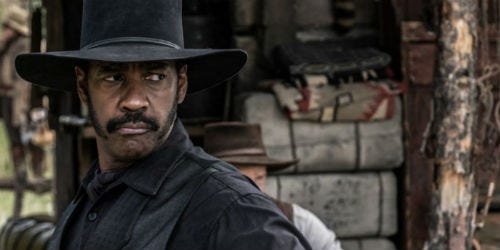The Magnificent Seven
When the original "The Magnificent Seven" was released in 1960, it was already a remake of Akira Kurosawa's “Seven Samurai.” Reviewers in were pretty snide about it. I could be snide about how well a remake remakes a remake, but you know how you feel about the first “Magnificent Seven,” so let's dispense with that. The new "Magnificent Seven” is far from magnificent, but hey, it's pretty good!
You know the plot, but let's review: A small town hires a nomadic protector to help them ward off a group of villains. The protector goes and hires more of his kind of help him do so. Despite their differences, the group of men works together to save the innocent people. Not all of them make it out alive. In the final scene, the appropriate dramatic conclusions are drawn depending on the culture in which the story is being told.
Groovy.

In this rendition, Denzel Washington plays Sam Chisolm, a bounty hunter hired by Emma Cullen (Haley Bennett) to protect her town of Rose Creek from Bartholomew Bogue (Peter Sarsgaard), an nasty industrialist prone to preach. Let's say this up front: Washington, clad in all black, guns blazing, is transcendent. He's just a dazzling sight to behold. Bang, bang, bang!
Chisolm recruits six additional men of diverse backgrounds and fighting styles that define them: Josh Farraday (Chris Pratt), the Steve McQueen of the group, a young, sexy, charming gambler in it for adventure; Goodnight Robicheaux (Ethan Hawke), a former Confederate sniper haunted by ghosts of the War of Northern Aggression; Jack Horne (Vincent D'Onofrio), a soft-spoken pious scalp hunter; Billy Rocks (Byung-hun Lee), a knife-throwing assassin; Vasquez (Manuel Garcia-Rulfo), a Mexican outlaw; and Red Harvest (Martin Sensmeier), a Comanche warrior. Each actor is perfectly cast, and their performances carry the script. Pratt is a standout and D'Onofrio is simply inspired. See it for them alone.
“The Magnificent Seven” is a modern blockbuster in every way. The violence is both excessive and over-the-top. It moves from beat to beat to beat with a raw efficiency. Characters are defined by their violence. "The Avengers" is all over this movie, as it should be: Marvel films have perfected the ensemble action movie for this generation (and popularized the bow-wielding hero fad, as seen here via Red Harvest). Seeing as “The Avengers” was in itself influenced by classic Westerns (and next year's “Justice League” is lifting the “Seven Samurai” plot template completely), “The Magnificent Seven” is a direct descendant of itself.
Anyway, it's interesting to see how time and technique sand and smooth away the way a story is told. "The Magnificent Seven" is a modern take on a classic tale, updated in the telling and in the representation seen in its cast. The diversity of director Antoine Fuqua's cast is a headline feature of the movie, and it deserves a lot of credit. Kind of. His decision to avoid ivory-white savior syndrome was smart, and giving Bennett a larger role also helps the movie feel modern. This should be a model for all action movies.
That said, the Native American character is kind of a weird caricature, and making the Asian guy a ninja is also somewhat questionable. Then there's the southern guy who's a genteel drunk, the hot white guy who's the most likable and the black guy who's an ex-slave who survived a lynching. So your mileage on the representation may vary. None of the characters is depicted in an inherently negative, stereotypical way, and are each positive, interesting, moral characters.
The biggest problem with "The Magnificent Seven" is ultimately the script, written by Nic Pizzolatto and Richard Wenk, of respective “True Detective” and “The Expendables 2” fame. Pizzolatto hasn't always hit it out of the park, but he has a definitive style, one that seems to shine through most in the hardscrabble, metaphor-laden dialogue spoken by Bogue. Beyond that, there is very little weight to the whole endeavor. I felt like there might be shadows of a deeper script at times, one that plays on the time-relative racial disparities or at least allows the characters to be more than their respective action-oriented cultural specialities.
I'm probably seeing things that aren't there.
Equally lousy is the score, largely phoned in by Simon Franglen. (The late James Horner is co-credited, having started compositions prior to his death in 2015. But Franglen does the lion's share.) Elmer Bernstein's iconic theme from the original is present at all times, but every other piece of music is generic and bland. It expresses noting and adds nothing to the story. I found myself thinking I would gladly watch a cut without any music at all.
“The Magnificent Seven” is entertaining in the moment. It's not the kind of movie that would ever get play on television or on college campuses, which is how the original became so widely adored and endearing. It's too fast, too angry, too violent, too shallow. It isn't memorable, but has good performances and characters. It is perfectly calculated summer entertainment with an aptly timed mid-September release, seeing as it's hot as hell outside and global warming is going to kill all of us.


